The Graduate Nursing Project collection includes Doctor of Nursing Practice (DNP) Scholarly Projects and Master's students' non-thesis projects submitted as part of program requirements.
TO
- Graduate Nursing Project, Doctor of Nursing Practice, DNP99
- Graduate Nursing Project, Doctor of Nursing Practice, DNP, Psychiatric / Mental Health25
- Graduate Nursing Project, Doctor of Nursing Practice, DNP, Neonatal10
- Graduate Nursing Project, Doctor of Nursing Practice, DNP, Psychiatric / Mental Health, Poster10
- Graduate Nursing Project, Doctor of Nursing Practice, DNP, Primary Care FNP8
- More
| Title | Creator | Date | Description | Relation Is Part Of | ||
|---|---|---|---|---|---|---|
| 1 |
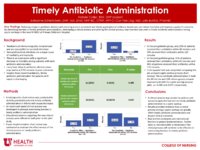 |
Timely Antibiotic Administration | Collier, Natalie | 2019 | POSTER | Graduate Nursing Project, Doctor of Nursing Practice, DNP |
| 2 |
 |
Timely Antibiotics Administration: Impact of Clinical Process on Barriers Delaying Time to Antibiotic Administration in Septic NICU Patients | Collier, Natalie | 2019 | A retrospective chart review identifying potential barriers to timely antibiotic administration was performed on 51 individual patients who presented with clinical sepsis in 2017- 2018. Prior to the education and implementation of the clinical process in Fall 2018, a survey was conducted to obtain a... | Graduate Nursing Project, Doctor of Nursing Practice, DNP |
| 3 |
 |
Flight Paramedics Can Safely Administer Blood Products to Trauma Patients: Decreasing the Time to Blood Administration Improves Patient Outcomes | Foley, Jenifer | 2019 | Background and Objectives Early administration of blood products to trauma patients in the prehospital setting is associated with improved outcomes. Paramedics are vital components of many flight teams but do not receive education on blood administration in their education track. The literature indi... | Graduate Nursing Project, Doctor of Nursing Practice, DNP |
| 4 |
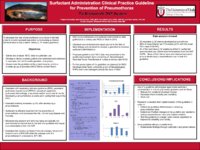 |
Surfactant Administration Clinical Practice Guideline for Prevention of Pneumothorax | Brinkerhoff, Tia | 2017 | POSTER | Graduate Nursing Project, Doctor of Nursing Practice, DNP |
| 5 |
 |
Surfactant Administration Practice Guidelines for Late Pre-Term and Greater Gestation Neonates | Brinkerhoff, Tia | 2017 | The purpose of this project was to develop a surfactant administration guideline to decrease the rate of pneumothoraces in moderate-late preterm and term neonates. Currently there are no clear guidelines for surfactant administration in this population yet research has pointed to significant benefit... | Graduate Nursing Project, Doctor of Nursing Practice, DNP |
| 6 |
 |
Developing and Implementing Medication Administration Protocol in a Residential Treatment Facility | Krambule, Heather | 2020 | Background:In the United States, medication errors are responsible for thousands of deaths every year in the pediatric population. Residential treatment facilities hire unlicensed medical staff to administer medications with minimal training and supervision from a licensed medical provider. The stat... | Graduate Nursing Project, Doctor of Nursing Practice, DNP, Psychiatric / Mental Health |
| 7 |
 |
Insulin and Diabetes Education: An Intervention to Decrease Medication Errors | Hill, Jordan | 2022 | Nursing professional development practitioners (NPDPs) at an academic hospital brought attention to insulin administration errors on the intensive care units, women's specialty units, and acute care floors. This project aims to decrease insulin administration errors at this academic hospital. The ob... | Graduate Nursing Project, Master of Science, MS, Nursing Education |
| 8 |
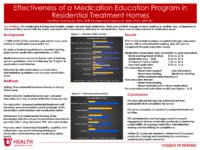 |
Developing and Implementing Medication Administration Protocol in a Residential Treatment Facility | Krambule, Heather; Allen, Nancy A. | 2020 | POSTER | Graduate Nursing Project, Doctor of Nursing Practice, DNP, Psychiatric / Mental Health, Poster |
| 9 |
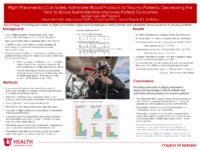 |
Flight Paramedics Can Safely Administer Blood Products to Trauma Patients: Decreasing the Time to Blood Administration Improves Patient Outcomes | Foley, Jenifer | 2019 | POSTER | Graduate Nursing Project, Doctor of Nursing Practice, DNP, Acute Care, Poster |
| 10 |
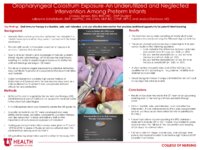 |
Oropharyngeal Colostrum Exposure-An Underutilized and Neglected Intervention Among Preterm Infants | Jensen, Lindsey; Schefeilbein, Julieanne; Davidson, Jessica | 2021 | POSTER | Graduate Nursing Project, Doctor of Nursing Practice, DNP, Neonatal, Poster |
| 11 |
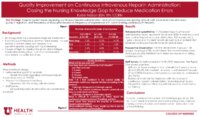 |
Quality Improvement on Continuous Intravenous Heparin Administration: Closing the Nursing Knowledge Gap to Reduce Medication Errors | Nelson, Kylee | 2021 | POSTER | Graduate Nursing Project, Master of Science, MS, Nursing Education, Poster |
| 12 |
 |
Understanding and Improving Heparin Administration | LaValley, Sydnie | 2022 | At a 400-bed teaching hospital in the Mountain West, unfractionated heparin administration continues to be a source of medication errors despite attempts to mitigate the inherent risks and improve education for all healthcare providers involved. Other institutions have completed quality improvement ... | Graduate Nursing Project, Master of Science, MS, Nursing Education |
| 13 |
 |
Safe Environment for Every Kid: Screening Tool Implementation for Quality Improvement in a Primary Care Pediatric Clinic | Collins, Whitney; Sylvester, Robert; Visick, Michael | 2020 | POSTER | Graduate Nursing Project, Doctor of Nursing Practice, DNP, Primary Care / FNP, Poster |
| 14 |
 |
Quality Improvement on Continuous Intravenous Heparin Administration: Closing the Nursing Knowledge Gap to Reduce Medication Errors; Nomograms | Nelson, Kylee | 2021 | Anticoagulants are considered a high-alert or a high-risk medication (D'Souza et al., 2019; Johnson et al., 2018; Kindelin et al., 2020; Oertel & Heparin Consensus Group, 2004). This is due to their narrow therapeutic index and the "ability to cause significant patient harm or death" ... | Graduate Nursing Project, Master of Science, MS, Nursing Education |
| 15 |
 |
Improving Compliance with the Intravenous Heparin Protocol on a Neurocritical Care Unit | Castle, Bronwynne | 2022 | POSTER | Graduate Nursing Project, Doctor of Nursing Practice, DNP, Primary Care / FNP, Poster |
| 16 |
 |
Using a Modified Early Warning System (mEWS) to Improve Time to Antibiotic Administration in Cancer Patients with a Sepsis Diagnosis | Peters, Charli | 2016 | Sepsis is the leading cause of death in the hospital setting. According to the Surviving Sepsis Campaign, early identification of sepsis and intervention with early goal-directed therapy protocols that include administration of antibiotics improve patient outcomes. Often, there are delays in the rec... | Graduate Nursing Project, Doctor of Nursing Practice, DNP |
| 17 |
 |
Safe Environment for Every Kid: Screening Tool Implementation for Quality Improvement in a Primary Care Pediatric Clinic | Collins, Whitney | 2020 | Background Child abuse and neglect are significant issues in our world today with over 700,000 substantiated cases annually, costing our country more than 124 billion each year. More than four children die daily in the United States due to child maltreatment and yet it is rarely addressed in the pri... | Graduate Nursing Project, Doctor of Nursing Practice, DNP, Primary Care FNP |
| 18 |
 |
Patient Safety Team: Near-Miss Medication Errors and Predicting Serious Safety Events | Gashler, Alexis | 2020 | Medical errors remain a leading cause of death and poor patient outcomes during hospitalization in the United States (Oyebode, 2013; Rodziewicz & Hipskind, 2019). The Institute of Medicine reported that medical errors result in at least 7,000 deaths and cost 17-29 billion dollars annually (Oyebode,... | Graduate Nursing Project, Master of Science, MS, Nursing Education |
| 19 |
 |
Decreasing the Inappropriate Use of Pain and Sedation Medications in a Level III NICU | Schaeffer, Lisa | 2020 | Background: Overuse of pain and sedation medications continue to be a problem in newborn intensive care units (NICU). The use of pain and sedation medications can have harmful long term neurodevelopmental sequlae and these medications should only be used when nonpharmacological interventions are not... | Graduate Nursing Project, Doctor of Nursing Practice, DNP, Neonatal |
| 20 |
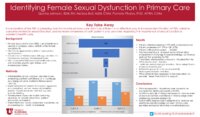 |
Identifying Female Sexual Dysfunction in Primary Care | Johnson, Quinta | 2023 | POSTER | Nursing Practice Project, Doctor of Nursing Practice, DNP, Nurse Midwifery / Women's Health, Poster |
| 21 |
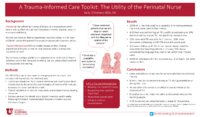 |
A Trauma-Informed Care Toolkit: The Utility of the Perinatal Nurse | DiStefano, Kelly A.S. | 2023 | POSTER | Graduate Nursing Project, Doctor of Nursing Practice, DNP, Nurse Midwifery / Women's Health, Poster |
| 22 |
 |
RE-AIM Framework for Evaluating Peri-operative Nozin®: A Topical Nasal Antiseptic | Kinikini, Susana | 2019 | POSTER | Graduate Nursing Project, Doctor of Nursing Practice, DNP, MS to DNP, Poster |
| 23 |
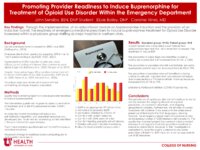 |
Promoting Provider Readiness to Induce Buprenorphine for Treatment of Opioid Use Disorder Within the Emergency Department | Sensiba, John A.; Bailey, ElLois; Vines, Caroline | 2022 | POSTER | Graduate Nursing Project, Doctor of Nursing Practice, DNP, Psychiatric / Mental Health, Poster |
| 24 |
 |
Improve Adherence to the Nurse-Driven Continuous Intravenous Heparin Administration Protocol on a Neurocritical Care Unit | Castle, Bronwynne | 2022 | Background: Anticoagulation therapy is associated with high rates of dosing errors, and intravenous heparin therapy accounts for two-thirds of those errors. The therapeutic margins for heparin are narrow, and errors result in coagulation times that are too short or prolonged and can produce harmful ... | Graduate Nursing Project, Doctor of Nursing Practice, DNP, Primary Care FNP |
| 25 |
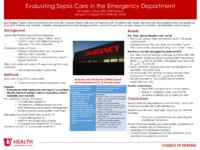 |
Evaluating Sepsis Care in the Emergency Department:A Descriptive Analysis of Sepsis Care and Treatment | Oliver, Christopher J.; Clayton, Margaret F. | 2020 | POSTER | Graduate Nursing Project, Doctor of Nursing Practice, DNP, Primary Care / FNP, Poster |
